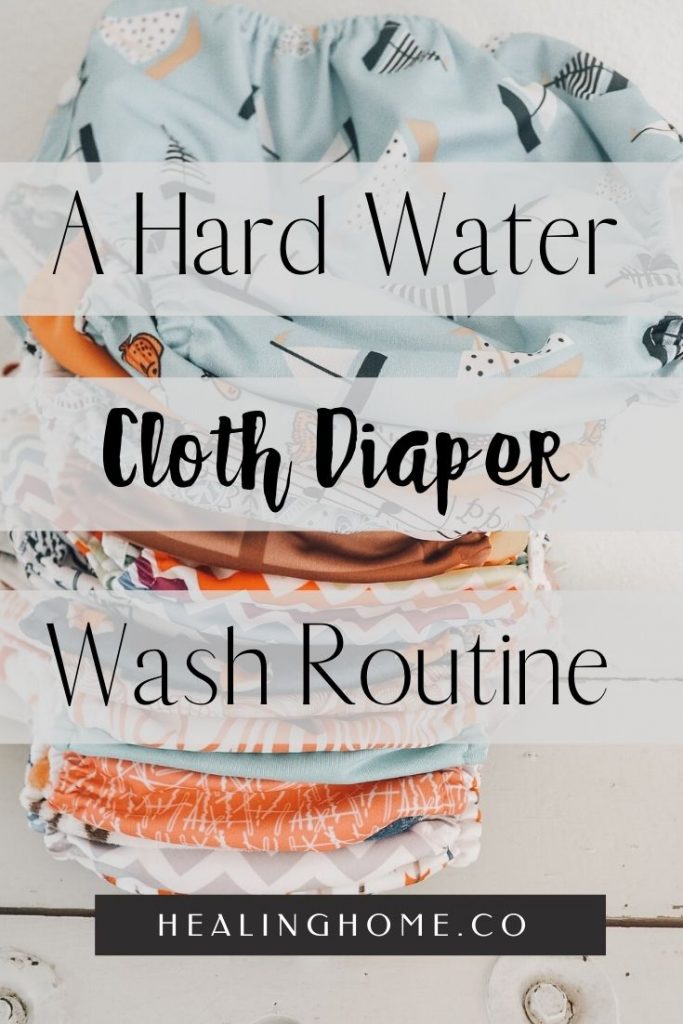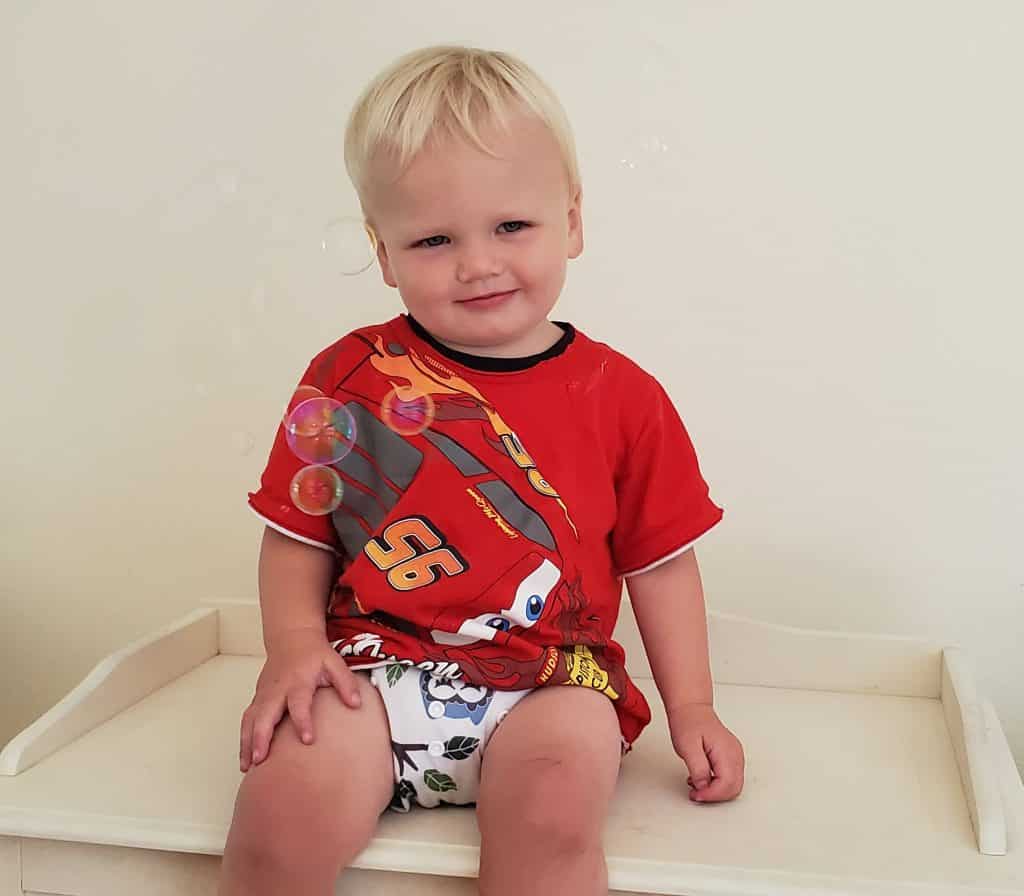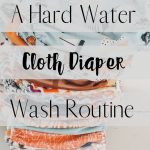A cloth diaper wash routine is going to be unique to every family that chooses cloth diapers. There is a plethora of denominators that will affect how you will create a wash routine. When I started researching washing my diapers these are the things I considered.
- How hard is my water? How will this affect my wash routine?
- Can I be ‘crunchy’ with my detergent yet still get my diapers clean?
- How will my washer affect my cloth diaper routine?
- Will I need to wash differently according to my style of diaper?
Your cloth diaper wash routine is going to look different than my diaper routine, but here’s why there are hundreds of articles on different cloth diaper wash routines.
Bottom Line: We can learn from each other’s wash routines how to perfect our own.

This page may contain affiliate links. To view my full affiliate link disclosure, click here. There are Amazon affiliate links in this post. As an Amazon Associate, I make a small commission from Amazon links in this post. Find our privacy policy, terms of service, and more information about user data by visiting the links above.
How Does my Water Effect my Wash Routine?
I tried so hard not to test my water hardness when I was first getting started.
Oh please, oh please don’t make that mistake. Just buy the water testing strips and test your water hardness. It will make all the difference in what you decide to buy.
This is the one that I purchased. It’s simple and effective. No bells and whistles.
Once I tested the water then I could proceed in determining what type of laundry detergent I would need, and the other products would be required to keep my diapers clean and my baby’s bum safe.
When we have added all the appropriate softeners to our water it still will test at about 80 PPM. Without our water softener salt, we range upward of 180, which is incredibly high. We have well water, not city water. If you have city water, most likely your water hardness will test lower. These test strips test for the magnesium and calcium in your water. They are specifically testing for minerals.
Bottom Line: Your water hardness will effective the products you buy to keep your baby’s bum safe and diapers clean.
If you are a cloth diaper mama, have you ever heard of Cotton Booty? Can I just say this thing is a hoot and a half! It is a subscription box that delivers cloth diapers right to your door, along with accessories! It’s adorable and practical if you are getting started in your cloth diaper journey, or if you are an established cloth diaper and love all the aspects of cloth diapering.
The Crunchy Mama Conundrum
I’m not the crunchiest mama out there, but I do prefer natural products, organic food, and a general desire to keep my home and family chemical-free.
That’s a problem when it comes to cloth diapering because those diapers are going to get stinky and icky. You cannot wash diapers with 100% natural soap. I’m sorry to those ultra-crunchy mama’s out there. It just cannot be done. Soap is only effective in certain water conditions. Detergent lifts away bacteria and buildup to give you a clean diaper.
We can combat our desire to be crunchy by purchasing and using ‘more’ natural products like plant-based detergents and simplified ingredients.
If you are ready to take my word for it, you can move on to the next section, but if you are like me and need extensive information, the following three articles are helping in understanding why detergent is necessary to your diaper cleaning routine.
What are detergents made up of?
Bottom Line: You will need to use a detergent in your cloth diaper washing.

What do You Wash Cloth Diapers With?
Based on your water hardness and crunchy level, you can now start researching the type of products that are right for you. The easiest place to find a detergent for your wash routine is to use the Fluff University Detergent Index. Here is what I use:
Keep in mind I use these products because I desire to keep my routine plant/naturally based and my water is extensively hard and full of heavy metals.
- Seventh Generation Ultra Power Plus
- Borax
- Hydro-Peroxide
Seventh Generation Ultra Power Plus:
This is a plant-based product. One of the things I truly appreciate about Seventh Generation is that they will explain on their ingredient list what each ingredient intended purpose is. This ingredient list is copied directly from their website.
Ingredients: Water, laureth-6 (plant-derived cleaning agent), sodium citrate (plant-derived water softener), sodium lauryl sulfate (plant-derived cleaning agent), glycerin (plant-derived enzyme stabilizer), sodium chloride (mineral-based viscosity modifier), oleic acid (plant-derived anti-foaming agent), sodium hydroxide (mineral-based pH adjuster), calcium chloride (mineral-based enzyme stabilizer), citric acid (plant-derived pH adjuster), protease, amylase, pectinase, and mannanase (plant-derived enzyme blend soil removers), and benzisothiazolinone and methylisothiazolinone (synthetic preservatives).
You will notice there is a synthetic ingredient and a few others that might make your crunchy mind cringe. I personally chose this product because it was the purest detergent that would cut through my horribly hard water and clean our diapers.
The best place to start when researching detergent is Fluff University’s Detergent Index.
You won’t regret starting there, the index is massive and an amazing resource.
Borax:
I prefer using Borax over its counter-part Calgon because it is simply sodium borate, which is a natural mineral found all over the world. It will help to soften your water which will make the detergent more effective as it pulls away from the filth from the material.
Hydro-Peroxide:
I only use Hydro-Peroxide when they are extremely stinky, or I am stripping my diapers.
Bottom Line: I personally have found these three ingredients the most useful, effective, and pure for washing diapers.
Can You Wash Cloth Diapers with Other Clothes?
The short answer is, yes. However, cloth diapers are different than other laundry, so be mindful of what you are putting with the load. If your cloth diaper wash routine is consistent and you have found ingredients that help the hard water of your house, your diapers and extra clothes will be completely clean.
Items you don’t want to wash together:
- Dedicates – Cloth Diapers need lots of agitation which can ruin dedicates.
- Greasy clothes or heavily soiled clothes – I would never wash my husband’s work clothes with our cloth diapers. Different chemicals or grease can affect the absorbency of cloth diapers.
- Towels – It may seem effective to put large towels in with your cloth diapers. These are really easy to get your diapers wound up in and will affect how clean your diapers get.
Items that may wash well together:
- Clothing without lots of ‘extras’
- Extras include things like zippers, hoods, strings, buttons or decals.
- Socks and underwear
- Washcloths
- Kitchen towels
- Kids Clothing
How Often do you Have to Wash Cloth Diapers?
Cloth diaper washing is a loaded question! Here are a few things to consider:
- How many diapers do you have?
- If you have around 30-40 diapers, that is enough to get through 3-4 days of changes for a newborn.
- The stink factors
- Diapers are stinky. There are many things that factor into how stinky your diapers get. A change in your child’s diet all the way to how clean your diapers got the previous load can change the stink level of your load. I recommend waiting no more than 3 days to wash a load of diapers.
- Mildew and mold
- If you wait any longer than 3-4 days to wash your diapers, they will start to collect excess bacteria that you do not want on your diapers.
Bottom Line: Wash your diapers every 2-3 days.

Cloth Diaper Wash Routine
This is our simplified Wash Routine.
You want the diaper load to be a stew consistency. Basically, this means not too full and not too empty. The correct consistency will help get the correct agitation in your washer and therefore cleaner diapers.
Cloth Diaper Pre-Wash
Diapers need to be pre-washed in order to remove the initial filth and then the actual wash will deep clean the diapers.
- Set Washer to the hottest setting.
- Add 1 capful of Seventh Generation Ultra Power Plus
Cloth Diaper Main Wash
- Set washer to the hottest setting
- Use 1 capful of Seventh Generation Ultra Power Plus
- Add 1/8-1/4- a cup of Borax
- The Borax is added to combat hard water. If your water is not hard, there is no need to add this.
NOTE: I ended up using too much borax for an extended period of time and we ended up combating a beastly diaper rash for many months. Use borax wisely and within the recommended amounts.
Cloth Diaper Drying
I initially tried my inserts and pocket covers separately. Elastic in diapers tend to get worn out with repeated heat, so hang drying the pocket covers separately protects the durability.
However, as the months progressed, I found that because we needed our diapers to be ready to go faster and because we ‘deal’ shop for our diapers, we didn’t mind if they became a bit worn.
Today, we throw all the inserts and covers in the dryer on a heat cycle and let them dry altogether. Pretty straightforward and simple. You have to decide if the wear on your diapers with the heat is worth it.
Bottom Line: This is a simple and effective cloth diaper wash routine. You may want to modify it according to your own standards. The FREE printable below is a resource just for that!
Organizing your Wash Routine
Remember when I said way at the beginning that everyone’s cloth diaper wash routine is unique but we can learn from one another?
That is the main theme of this resource! The above cloth diaper wash routine is just a resource for you to learn from. You don’t have to do it exactly like me! I have modified my wash routine multiple times to fit my needs.
As I have modified my cloth diaper wash routine, I have noticed that it is extremely helpful to have the routine outlined for not only myself but others that might be helping to wash the diapers. Husbands for example may need a cheat sheet! You won’t want to miss the printable that allows you to change, highlight, and summarize your own unique cloth diaper routine.
I love talking about cloth diapers, pop over to my facebook or instagram page to continue the conversation!





